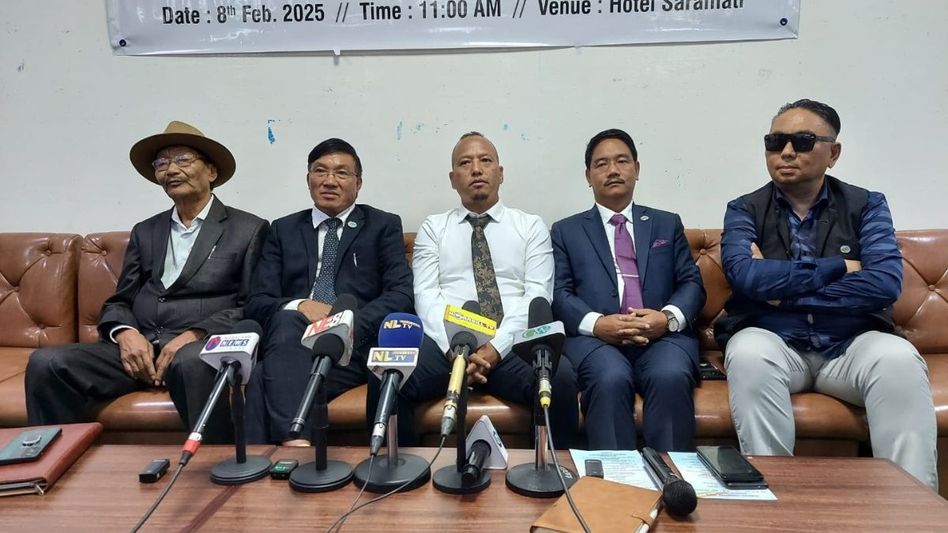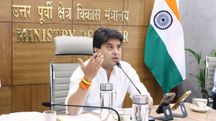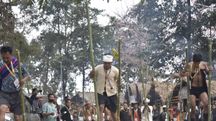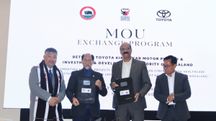Naga political solution: WC NNPGs and NSCN-IM await GoI's response
The Ato Kilonser (Prime Minister) of GPRN/NSCN (Unification), Alezo Venuh, has disclosed that a roadmap for resolving the longstanding Indo-Naga political issue already exists in the form of a draft submitted by both the Working Committee of Naga National Political Groups (WC NNPGs) and the National Socialist Council of Nagalim (NSCN-IM) to the Government of India.

The Ato Kilonser (Prime Minister) of GPRN/NSCN (Unification), Alezo Venuh, has disclosed that a roadmap for resolving the longstanding Indo-Naga political issue already exists in the form of a draft submitted by both the Working Committee of Naga National Political Groups (WC NNPGs) and the National Socialist Council of Nagalim (NSCN-IM) to the Government of India.
However, he stated that the onus is now on the Government of India to take the next step, as "they are the givers."
“The ball is in the court of the Government of India,” he said.
Speaking to the media on the sidelines of the Installation ceremony programme of WC NNPG in Dimapur, Venuh noted that the Government of India is yet to present its version of the draft. "So only after that, whether that kind of draft is coming out from the Government of India side or the roadmap which the Government of India is ready to give, we will know the way forward," he said.
He further emphasized that both WC NNPGs and NSCN (IM) have their respective roadmaps, which he believes are beneficial for the Nagas. However, the WC NNPGs have yet to review the contents of the charter of demands presented by the NSCN (IM), while their own roadmap has been agreed upon in principle and documented in black and white.
Venuh urged the Government of India to expedite the process, reminding that the talks had officially concluded on October 31, 2019. He pointed out that democracy does not always offer a 100% consensus, but the voices of the majority should be acknowledged.
"The message is loud and clear—enough is enough," he asserted, adding that civil societies, NGOs, and intellectuals are growing impatient with the delay.
Also Read: Nagaland: Dimapur Naga Students' Union raises concerns over Smile App, shortage of teachers
On the role of the Nagaland government, Venuh stated that since the conclusion of the talks in 2019, the Working Committee has remained open to discussion. He stressed that the solution was never expected to be full sovereignty, a fact that was made clear from the beginning.
He urged Nagaland Chief Minister Neiphiu Rio and the 60 MLAs to take decisive action and provide proper feedback to the central government regarding the urgency of the issue. "As public representatives, they should not ignore the sufferings of the people but instead act responsibly," he said.
The legitimacy of the Working Committee has been questioned due to the emergence of two groups claiming to be the real representatives.
Addressing this, GPRN/NSCN (Reformation) President, Wangtin Naga stated that while there are two factions, to them, there is only one NNPG.
N Kitovi Zhimomi, who was impeached from GPRN/NSCN (Unification) last year, recently formed another group and elected a new convenor and co-convenors of the WC NNPGs. However, Wangtin maintained that Zhimomi remains a part of Naga political talks since the Agreed Position was signed collectively under that banner of NNPG, to which he was the convenor.
Regarding the future of negotiations, Wangtin clarified that the question of further talks does not arise as the discussions officially concluded on October 31, 2019. "The talks were not concluded by us (NNPGs) but by the Government of India, which fixed the deadline. We were compelled to conclude the talks, and it is now a part of history," he stated.
If the Government of India were to invite them again, Wangtin asserted that all factions would participate, as the issue concerns all Nagas.
On the Government of India's move to fence the Indo-Myanmar border, WC NNPGs Working Convenor, Col (Retd) Isak Sumi reaffirmed their consistent stand on protecting Naga-inhabited areas. He noted that the Agreed Position allows for a free movement regime, currently limited to 16 km.
Sumi stated that their proposal to extend this regime beyond 36 km has already been agreed upon in principle. "Once the Agreed Position is implemented, the controversy over border fencing will not arise," he said.
Addressing concerns from the student community about the rise of multiple splinter groups, Sumi acknowledged the proliferation of "many self-proclaimed political groups." He attributed this to external influences but stressed the importance of identifying genuine political groups.
"The Naga people must now speak up, expose lies and deception, and identify the groups genuinely committed to resolving the Naga issue," he urged.
Copyright©2025 Living Media India Limited. For reprint rights: Syndications Today









